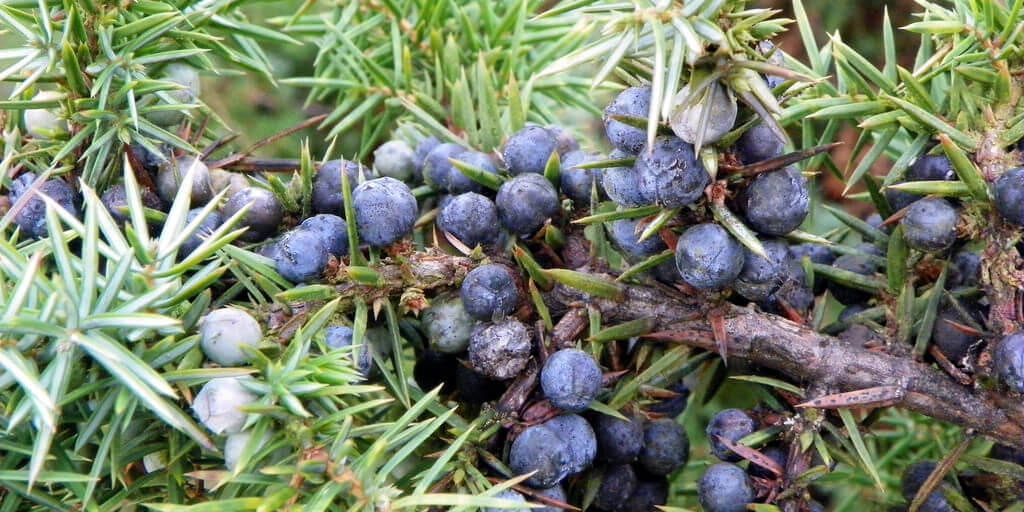Juniper (Juniperus communis) refers to a group of evergreen shrubs and trees belonging to the genus Juniperus, which is part of the cypress family Cupressaceae. These plants are distributed throughout the Northern Hemisphere, with various species found in North America, Europe, Asia and Africa.
Junipers are known for their needle-like or scale-like leaves, small berry-like cones called juniper berries and distinctive fragrance.
Natural Habitat of Juniper
Juniper is an evergreen tree that grows wild throughout parts of Europe, Asia, and North America. Though there are many varieties of juniper, the most common in North America is the Juniperus communis. This particular tree grows up to 10 feet tall and has needle-like leaves and seed cones.
In addition to their culinary and medicinal uses, junipers are valued for their ornamental qualities and are commonly grown in gardens and landscapes for their attractive foliage, shape, and texture. Some species of juniper are also used for timber, as they produce durable and aromatic wood that is used in woodworking and for making essential oils.
Which Part of Juniper Are Used Medicinally?
The medicinal parts of the juniper tree are commonly known as ‘berries’, but the dark blue-black scales that come from the cones are used medicinally as well.
Both juniper berries and foliage (scales or needles) have been used traditionally for their medicinal properties, with the berries being more commonly utilized internally for urinary and digestive health, while the foliage is often used externally for its antimicrobial and topical benefits.
Below we will look at both in more detail:
Juniper Berries:
Juniper berries are the most well-known part of the plant and have been used for culinary, medicinal and ceremonial purposes for centuries. They are often used as a flavoring agent in food and beverages, particularly in the production of gin.
Juniper berries are the most commonly used part of the plant in herbal medicine. They are harvested from female juniper plants and are typically blue-black or purple when ripe. They contain essential oils, flavonoids and other compounds.
In traditional herbal medicine, juniper berries are believed to have diuretic, digestive, and antimicrobial properties. They have been used to promote urinary tract health, aid digestion and treat various ailments.
The diuretic properties of Juniper berries help to increase urine production and promote urinary tract health. They are often used to support the kidneys and bladder and to address issues such as urinary tract infections (UTIs) and kidney stones.
Juniper berries are also used for their digestive benefits and may help stimulate digestion, relieve gas and bloating and improve appetite.
They are sometimes used topically as an ingredient in ointments or oils for skin conditions such as eczema, psoriasis, and arthritis.
Juniper Foliage (Scales or Needles):
The foliage of juniper, including the scales or needles, also contain medicinal compounds, albeit in lower concentrations compared to the berries.
Juniper foliage is rich in volatile oils, including terpenes and monoterpenes, which contribute to its aromatic and therapeutic properties.
Scales from the male juniper ripen in 18 months, whilst scales from the female juniper ripen within 2 to 3 years.
In herbal medicine, juniper foliage is primarily used for its antimicrobial properties. It may be used internally to help fight infections, particularly in the urinary and respiratory tracts.
Externally, juniper foliage may be used in poultices or herbal baths to soothe muscle aches and pains or to promote wound healing.
Health Benefits of Juniper
The natural antibacterial, antiviral, diuretic and antiseptic properties of Juniper lend themselves well to treatment of a variety of internal and external conditions. Historically, it served as a treatment against infectious diseases as well as an aid for childbirth.
Here are some of the key health benefits associated with Juniper:
Urinary Tract Health: Juniper berries are well-known for their diuretic properties, which may help increase urine production and promote urinary tract health. They are often used to support the kidneys and bladder and may help in conditions such as urinary tract infections (UTIs), kidney stones, and cystitis.
Digestive Support: Juniper berries may aid digestion and help relieve gastrointestinal issues such as indigestion, bloating, and gas. They stimulate digestive juices and enzymes, promoting better digestion and nutrient absorption.
Antimicrobial Properties: Both juniper berries and foliage contain compounds with antimicrobial properties, which may help fight bacterial and fungal infections. They have been traditionally used to treat various infections, including those affecting the urinary and respiratory tracts.
Anti-inflammatory Effects: Juniper berries and foliage contain antioxidants and anti-inflammatory compounds that may help reduce inflammation in the body. This could be beneficial for conditions such as arthritis, gout, and inflammatory skin conditions.
Antioxidant Activity: Juniper berries are rich in antioxidants, including flavonoids and polyphenols, which help protect cells from oxidative damage caused by free radicals. This antioxidant activity may have various health benefits, including reducing the risk of chronic diseases and supporting overall health and wellness.
Respiratory Health: Inhalation of juniper essential oil vapors may help alleviate respiratory symptoms such as congestion, cough, and bronchitis. The antimicrobial and expectorant properties of juniper can help clear the respiratory passages and ease breathing.
Skin Health: Juniper berries and foliage may have benefits for the skin when applied topically. They have been used in herbal remedies to soothe skin irritation, treat acne, and promote wound healing. Juniper essential oil is also used in aromatherapy for its skin-supporting properties.
Antioxidant and Anti-aging Effects: The antioxidant compounds found in juniper berries may help protect the skin from premature aging caused by environmental stressors such as UV radiation and pollution. Regular consumption of juniper berries may contribute to healthy, youthful-looking skin.
Juniper Use Specifically Relating to Childbirth:
Uterine Tonic: Juniper was thought to act as a uterine tonic, meaning it could help tone and strengthen the muscles of the uterus. By doing so, it was believed to promote more effective contractions during labor and facilitate the progression of childbirth.
Labor Stimulation: Juniper was also believed to have mild oxytocic properties, meaning it could stimulate uterine contractions. This action was thought to help initiate labor or strengthen contractions during labor, especially in cases of delayed or sluggish labor.
Pain Relief: Some traditional practices used juniper to help alleviate labor pains. While not a substitute for modern pain management techniques, juniper may have been used to provide some relief from the discomfort associated with childbirth.
Postpartum Support: In addition to its potential benefits during labor, juniper was sometimes used postpartum to aid in uterine involution, the process by which the uterus returns to its pre-pregnancy size and shape. It was believed to help the uterus contract and expel any remaining placental tissue.
It’s important to note that the use of juniper for childbirth is based on traditional knowledge and historical practices rather than scientific evidence. While juniper may offer potential benefits, its use during pregnancy and childbirth should be approached with caution and under the guidance of a qualified healthcare provider. Pregnant individuals should consult with a healthcare professional before using juniper or any herbal remedies to ensure safety for both mother and baby.
Juniper Essential Oil
Extracts and essential oils from the juniper berries/scales contain terpinen-4-ol, a compound that stimulates the kidneys and acts as a diuretic. Amentoflavone, another compound, has antiviral properties.
The essential oils of juniper also prove beneficial when inhaled. Inhalation of juniper is used to treat bronchitis and act as a pain reliever that numbs pain.
The use of juniper is not limited to medicinal use. The essential oils in juniper have a turpentine-like smell and a bitter taste. It is often used as a condiment or a flavoring for foods and beverages such as gin and bitters. Juniper can also be found in some cosmetics like lipstick, foundation, eye shadow, hair conditioner, bubble bath and bath oil.
Ingesting Juniper
Ingested forms of juniper assist with inflammation and increase production of stomach acid, making them useful remedies to help soothe the gastrointestinal system. It is a helpful treatment for conditions such as upset stomach, heartburn, flatulence, bloating, loss of appetite, gastrointestinal infections, and intestinal worms. The antiseptic properties in juniper disinfect the urinary tract to provide treatment and relief for conditions like urinary tract infections, urethritis, kidney stones, and bladder stones.
Juniper acts as a diuretic to help flush excess fluids from the body. This helps rid the body of excess uric acid which can lead to gout. It also reduces fluid around the joints.
Ingested juniper is high in natural insulin and therefore lowers blood sugar levels. It can also help heal the pancreas as long as no permanent damage has occurred on the organ. Juniper also alleviates problems associated with menstruation.
Topical Applications of Juniper
Juniper can be applied topically to treat skin ailments and conditions. It is used to treat conditions like acne, athlete’s foot, warts, skin growths, cystitis, psoriasis and eczema. Cade oil, which comes not from the berries but from the tree’s wood, is particularly helpful in treatment of psoriasis on the scalp.
Antibacterial properties make juniper a treatment for skin wounds and snakebites. Topical application also provides relief for joint and muscle pain and is especially helpful to those suffering from arthritis and rheumatism.
How to Take Juniper
Juniper is available in many forms, such as teas, capsules, ointments, lotions and oils. Tea is generally used for digestive problems whilst oils are often reserved for use in hot baths and for inhalation. Short-term use of 1000 to 2000 mg per day, divided into 2 to 3 doses, for up to 6 weeks, is generally considered safe for most people.
Shopping
| Visit the new SHOPPING page for a wide selection of great products! |
Always take care when taking herbs and Read Our Disclaimer.
Juniper Herb Notes / Side Effects
While juniper berries and other parts of the plant can offer potential health benefits, it’s essential to use them cautiously and under the guidance of a healthcare professional. Some species of juniper contain toxic compounds that can be harmful if ingested in large quantities, and excessive consumption should be avoided.
Additionally, juniper supplements may interact with certain medications, so it’s important to consult with a healthcare provider before using them, especially if you have underlying health conditions or are taking prescription medications.
Long-term use can lead to kidney problems, seizures, and other medical issues. Topical use of juniper can cause skin irritation, burning, redness, or swelling and should not be used to treat large wounds. Some individuals experience stomach and intestinal irritation after ingesting juniper that can worsen the initial condition.
Overuse of juniper can lead to diarrhea, urine with a purple tint, blood in the urine, intestinal pain, kidney pain, elevated blood pressure, and a quickened heartbeat. Extended use of juniper may interfere with the absorption of iron and other minerals.
Certain people should not take juniper. Laboratory tests have shown juniper to lower blood sugar too much in animals, a finding that may prove true in humans as well. Moreover, juniper interacts with diabetic medications.
Individuals should stop taking juniper at least two weeks before a scheduled surgery to prevent blood sugar concerns.
Women who are pregnant, trying to become pregnant, or breastfeeding should avoid juniper. It has been shown to cause uterine spasms which can affect fertility or lead to miscarriage. Juniper can be passed through the breast milk; it is uncertain how juniper affects babies.
As juniper is a natural diuretic, it interacts with other diuretic medications.
References:
HOFFMAN, DAVID. MEDICAL HERBALISM : SCIENCE AND PRACTICE OF HERBAL MEDICINE – 03 EDITION. HEALING ARTS PRESS, 2003.



Leave a Reply